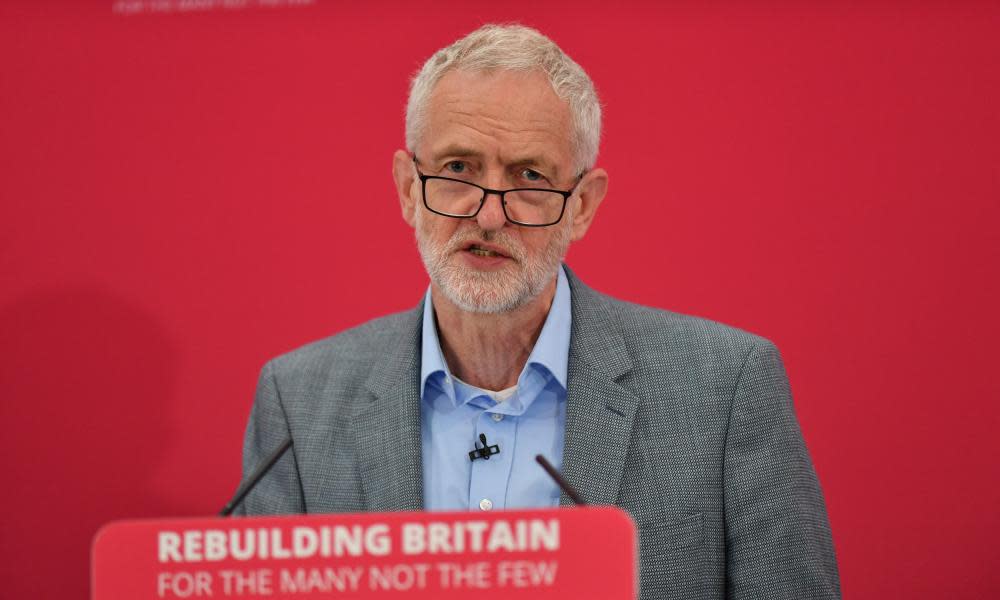Corbyn to outline Brexit strategy – but unlikely to cheerlead for remain

Jeremy Corbyn plans to use a speech in the coming days to outline the latest evolution in Labour’s Brexit policy – but is expected to stop well short of the clarion call for remain demanded by his deputy, Tom Watson.
The shadow cabinet will discuss Brexit on Wednesday, with the Labour leader under intense pressure from shadow ministers including Watson, Emily Thornberry and Keir Starmer to signal more clearly his support for a fresh referendum.
They will receive the second part of a polling presentation that began at last week’s meeting, underlining the fact that Labour’s vote is being squeezed both by the Liberal Democrats and the Brexit party.
Corbyn’s team postponed the planned meeting on Monday, as his deputy gave a provocative speech saying: “Our members are remain, our hearts are remain, our values are remain.”
Even some of Corbyn’s closest allies, including John McDonnell and Diane Abbott, have been urging him to shift towards more wholehearted backing for a referendum, or risk endangering the party’s prospects in a general election, which could come within months.
Two senior Labour sources told the Guardian that Andrew Fisher, Corbyn’s trusted policy chief, had also mooted a shift towards a more pro-remain stance, arguing that Labour’s nuanced message had landed poorly with both remain and leave voters.
In the wake of the party’s dire performance in last month’s European parliament elections, when it picked up just 14% of the vote, Corbyn did outline a shift in position, towards advocating a “public vote” on any Brexit deal.
But he subsequently said a referendum was “some way off”, and disgruntled grassroots members are still organising vigorously to try to put pressure on the leadership at the party’s autumn conference.
The Guardian understands Corbyn will flesh out and develop that position – a public vote on any Brexit deal agreed by a future government, Tory or Labour – in a speech, perhaps as soon as this week.
However, several shadow cabinet members, including Jon Trickett, Ian Lavery and Angela Rayner, remain wary about the impact on Labour voters in leave-supporting constituencies.
Some are also anxious about appearing to cave in to Watson, whom they believe is using Brexit as a “wedge” issue, to undermine Labour members’ support for Corbyn’s leadership.
There is little prospect of an immediate challenge to Corbyn, but some allies fear that a pro-remain candidate – perhaps Starmer, the shadow Brexit secretary – could in future win over remain-supporting members who are concerned about the party’s stance.
However, the party’s poor result in May has contributed to a change of heart among some shadow cabinet ministers who had previously been wary of a referendum.
Richard Burgon has told colleagues he believes the emergence of Boris Johnson as the frontrunner to be Britain’s next prime minister makes it easier for Labour to make the argument that the public should be given another say.
Meanwhile Watson took his argument to Twitter on Tuesday, publishing a video in which he chatted with young people about their views on Europe, and asked them what the shadow cabinet – of which he is a member – should do.
“The verdict: be bolder, be braver. We have to take a stand,” he said.
On the eve of our Shadow Cabinet meeting on Brexit, I've been asking young people what message they have for my colleagues. The verdict: "Be bolder, be braver. We have to take a stand."#proudlybritishproudlyeuropean pic.twitter.com/paS2jF7iBZ
— Tom Watson (@tom_watson) June 18, 2019
The debate over Labour’s policy has been sharpened in the wake of the European elections, when Vince Cable’s Lib Dems overtook Labour with a clear “bollocks to Brexit” slogan.
McDonnell tweeted immediately afterwards: “Can’t hide from hit we took last night. Bringing people together when there’s such a divide was never going to be easy.
“Now we face prospect of Brexiteer extremist as Tory leader & threat of no deal, we must unite our party & country by taking issue back to people in a public vote.”
However, Thornberry was dropped as Corbyn’s stand-in at prime minister’s questions earlier this month after strongly criticising the party’s campaign in a TV appearance on polling day.

 Yahoo News
Yahoo News 
